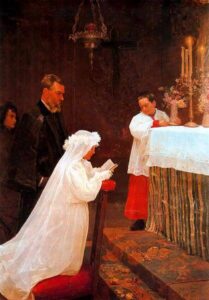The Sacrament of the Holy Eucharist, or Holy Communion, is “the source and summit of the Christian life” (Catechism, 1324). It is the Real Presence of the Body and Blood of Jesus, under the appearances of bread and wine (cf. Catechism, 1374). The Holy Eucharist was instituted by Christ at the Last Supper, which was the first Mass (cf. Catechism, 1337).
By receiving Holy Communion worthily, in a state of grace, a person is formed more closely into the likeness of Christ. “The principal fruit of receiving the Eucharist in Holy Communion is an intimate union with Christ Jesus” (Catechism, 1391). Through the Holy Eucharist the human soul is united and brought into communion with Christ. The Holy Eucharist, the Body and Blood of Christ, bestows actual grace in the person enabling the human soul to love God above all things and to love his neighbor as himself, so that this love might become a living virtue of charity habitually present as grace in the person’s soul.
Catholics should take care to prepare well to receive Jesus in Holy Communion, and not to be conscious of any unconfessed grave sin. As St. Paul urges us, “Whoever, therefore, eats the bread or drinks the cup of the Lord in an unworthy manner will be guilty of profaning the body and blood of the Lord. Let a man examine himself, and so eat of the bread and drink of the cup. For any one who eats and drinks without discerning the body eats and drinks judgment upon himself” (1Cor 11:27-29).
St. Julie Billiart is constantly seeking to renew itself as a parish intensely devoted to the Holy Eucharist. It does so by encouraging weekly Sunday Mass attendance, frequent daily Mass attendance, frequent Confession, Eucharistic Adoration, and other public and private devotions to the Blessed Sacrament.
If you have been away from the reception of Holy Communion and would like to speak with Father David Pignato , please contact him here on the Our Staff page.

